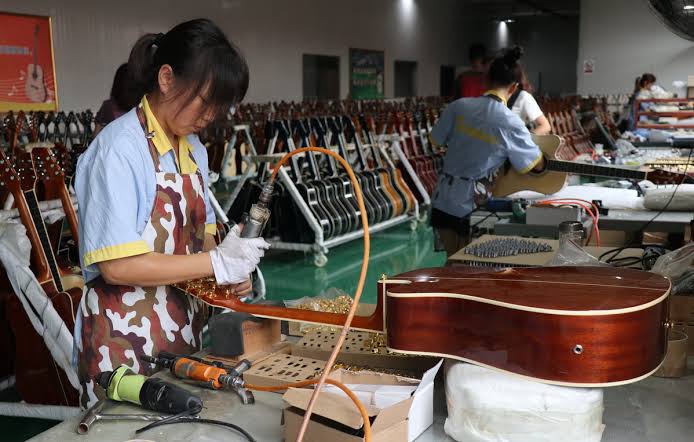An international guitar industrial park in Zheng’an county, Zunyi city, southwest China’s Guizhou province, produces six million guitars a year, which accounts for 20 percent of the country’s total annual guitar output and are sold to over 30 countries and regions.
The county’s success in developing the guitar industry is fundamentally attributed to the work of skillful and down-to-earth local guitar makers, said Chen Kunhua, an official in charge of vocational capacity building at the county’s employment bureau.
By building the labor service brand of “Zheng’an Guitar Craftsman”, the county has stimulated the growth of local guitar industry and made it a reliable source of income and road to prosperity for residents, according to Chen.
Located on the border between Guizhou and Chongqing municipality, Zheng’an nestles among high mountains and deep valleys, and lacks arable land. It has long been plagued by poverty.
In 1987, a great number of Zheng’an residents began to work as migrant workers in south China’s Guangdong province, which marked the beginning of Guizhou’s organized labor export to other regions.
Gradually, over 200,000 people out of the county’s total population of more than 600,000 worked outside their hometown all year round. Among these migrant workers, over 60,000 engaged in Guangdong’s guitar industry and many became technical professionals and were promoted to managerial roles.
In 2012, Zheng’an launched a project to encourage residents working elsewhere to come back home to start a business, since when the local guitar industry has been incubated.
“My hometown established a guitar industrial park. Companies only need to take care of their operation inside the park, for the government handles everything outside the park,” said Liu Jiangbo, one of the first batch of migrant workers who returned home to start their own businesses. They were motivated by a series of preferential policies concerning rent, tax and business environment construction rolled out by the local government.
In March 2016, Liu’s guitar company settled in the guitar industrial park and began with production. “Guitar-making is a labor-intensive industry that depends on manual work for nearly 70 percent of its procedures, even with machines,” he said.
In addition to technical professionals who came back to Zheng’an together with him, he also hired many people living near the industrial park. “We have built and expanded three production lines, and employed nearly 200 people. Most of them are local women,” Liu pointed out.
Within merely several years, a total of 104 companies have joined the industrial park, generating an annual comprehensive output value of 6 billion yuan ($941 million). At the same time, a complete guitar industrial chain covering guitar making, sale, logistics and other related industries has gradually taken shape.
“The local government has clear positioning for guitar industry. It has regarded the industry as a pillar industry and rolled out favorable policies, which are encouraging for practitioners in the industry,” Chen said, noting that Zheng’an has become a well-known guitar production base.
After over 200 procedures, high-quality guitars made in Zheng’an are brought to other regions from the mountainous county. Gradually, a stable workforce has been formed.
The local guitar industry has directly provided jobs for 9,242 residents and lifted 6,690 of them out of poverty. Nearly 100,000 people have secured employment in related industries.
In 2019, the labor service brand “Zheng’an Guitar Craftsman” was officially launched. Craftsmen under the brand are not only limited to guitar makers, but also include people engaging in the supply and sale of guitars and working in upstream or downstream industries, as each link of the industrial chain requires workers to always pursue excellence through hard work, according to Chen.
To encourage companies to attach importance to talent cultivation, the local government organizes regular activities to help them apply for municipal-level and provincial-level guitar master studio accreditation.
“The studios that obtain the accreditation can receive a subsidy of 100,000 yuan,” Chen said, adding that Zheng’an county now has 12 such studios in total.
The local government has also helped companies cooperate with schools to improve the skills of guitar craftsmen, Chen pointed out.
In October 2019, the first China Guitar Making Competition was held in Zheng’an, gathering over 300 guitar makers from across China.
“The event provides a platform for guitar makers to communicate with each other,” Chen said, adding that many craftsmen in Zheng’an won awards at the competition.
Chen believes that such guitar-making skill competitions have helped people better realize the urgency of building a guitar industry standard system.
The government will continuously guide vocational schools and the guitar industry in building and improving the industry standard system and formulating relevant vocational skill standards to create more development space for Zheng’an guitar craftsmen, Chen said.



